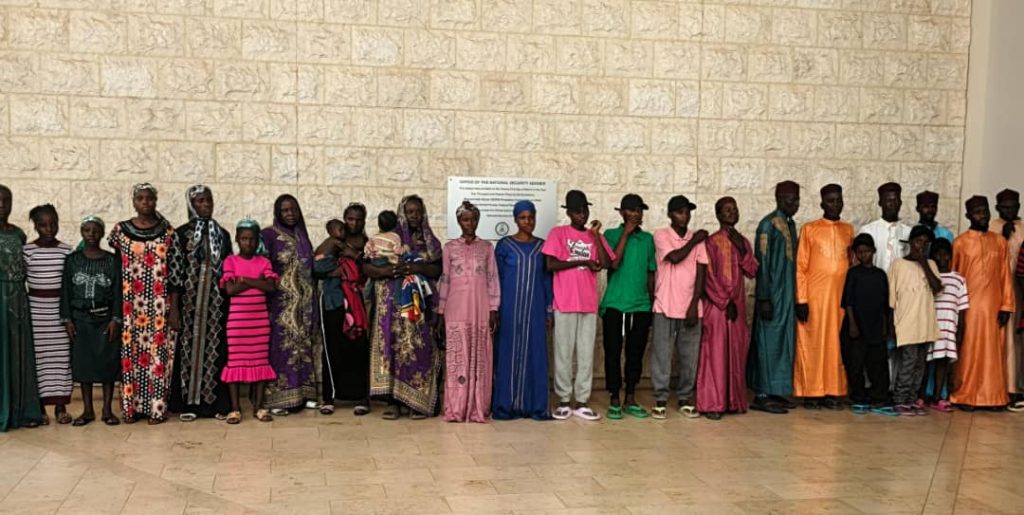The Harrowing Ordeal of Kidnapped Victims and the Government’s Resolve to Combat Banditry
Ishaya Kuka, brother to a prominent Catholic Bishop, found himself thrust into a nightmare when he was abducted by bandits. His agonizing experience, shared with the National Security Adviser (NSA) and Minister of Defence upon his rescue, painted a chilling picture of captivity. Chained to another captive, subjected to brutal beatings, and constantly threatened with death, Kuka had resigned himself to his fate, believing he would never see freedom again. He described how the bandits employed relentless torture to coerce victims into agreeing to ransom demands, emphasizing the pervasive fear and desperation that gripped those held captive. Kuka’s testimony offered a stark glimpse into the inhumane conditions endured by those who fall prey to these criminal gangs.
Adesanya Michael, a Deputy Director at the National Assembly Commission, also recounted his 32-day ordeal, chained and forced to witness the brutal murder of his wife. His story added another layer of tragedy to the human cost of banditry in Nigeria. The trauma of witnessing such violence, Michael explained, compels victims to comply with any demand, no matter how outrageous. Both Kuka and Michael’s accounts underscored the urgent need for effective measures to combat this escalating crisis. Interestingly, Michael offered a different perspective on the bandits themselves, describing them as young, illiterate, and possibly more victims of circumstance than hardened criminals. He advocated for rehabilitation and education rather than solely punitive measures, suggesting that some of these young men could be reintegrated into society with proper guidance and support.
The rescue of Kuka, Michael, and 58 other victims, orchestrated by Nigerian troops, offered a beacon of hope amidst the darkness. The NSA, Nuhu Ribadu, emphasized that this successful operation was a testament to the ongoing military efforts under President Bola Tinubu’s leadership. Ribadu reiterated the government’s commitment to restoring order and security, vowing to relentlessly pursue these criminals until justice is served. He also delivered a strong message to the public, urging families of kidnapped victims to resist paying ransoms. He argued that paying ransoms fuels the cycle of violence, empowering the bandits and perpetuating their criminal activities.
Ribadu’s plea to the public highlighted a critical challenge in the fight against banditry: the unintended consequences of ransom payments. While understandable that families will do everything to secure the release of loved ones, Ribadu emphasized the counterproductive nature of such actions. He implored Nigerians to trust the government’s efforts and refrain from paying ransoms, arguing that this is the most effective way to dismantle the bandits’ financial incentives and ultimately weaken their operations. He stressed that the government has never paid ransoms and will not do so, emphasizing their commitment to a different approach – one focused on military intervention, intelligence gathering, and ultimately, bringing the perpetrators to justice.
The Minister of Defence, Badaru Abubakar, echoed the NSA’s sentiments, reiterating the Tinubu administration’s unwavering determination to end insecurity. He emphasized the collaborative efforts of various security agencies and highlighted the importance of citizen cooperation in providing vital information to aid the fight against banditry. This call for public participation underscored the need for a united front against these criminal elements. The government’s strategy, it seemed, relied not only on military might but also on intelligence gathering and community engagement to effectively dismantle these criminal networks.
The rescue operation, resulting in the liberation of 60 individuals, including 35 males and 25 females, demonstrated the potential of coordinated efforts involving various security and intelligence agencies. The operation, spanning Kaduna State and the Federal Capital Territory, showcased the government’s commitment to tackling the banditry problem head-on. The rescued victims’ stories served as a stark reminder of the human cost of this ongoing crisis, while the government’s response offered a glimmer of hope that, through concerted efforts and public cooperation, an end to this reign of terror could be achieved. The challenge remained, however, to translate these successful operations into a sustained and comprehensive strategy to eradicate banditry and restore lasting peace and security to affected communities.


